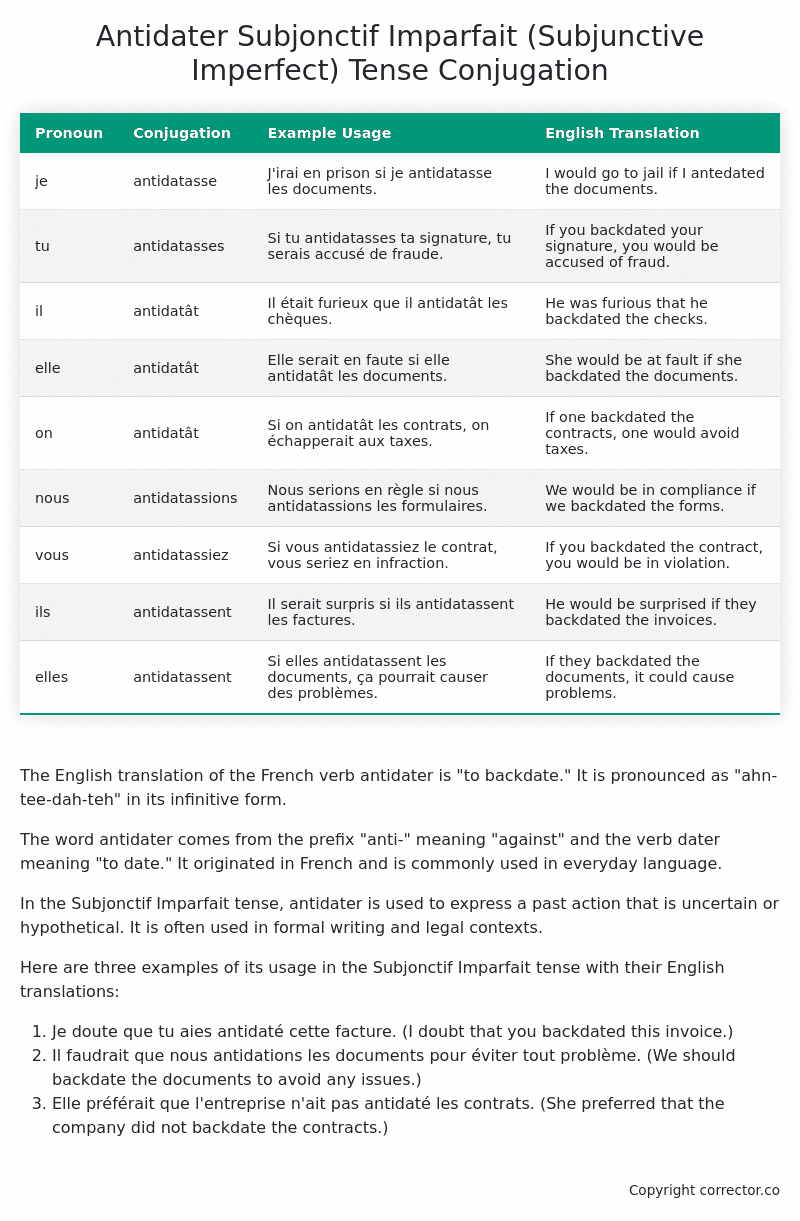Subjonctif Imparfait (Subjunctive Imperfect) Tense Conjugation of the French Verb antidater
Introduction to the verb antidater
The English translation of the French verb antidater is “to backdate.” It is pronounced as “ahn-tee-dah-teh” in its infinitive form.
The word antidater comes from the prefix “anti-” meaning “against” and the verb dater meaning “to date.” It originated in French and is commonly used in everyday language.
In the Subjonctif Imparfait tense, antidater is used to express a past action that is uncertain or hypothetical. It is often used in formal writing and legal contexts.
Here are three examples of its usage in the Subjonctif Imparfait tense with their English translations:
- Je doute que tu aies antidaté cette facture. (I doubt that you backdated this invoice.)
- Il faudrait que nous antidations les documents pour éviter tout problème. (We should backdate the documents to avoid any issues.)
- Elle préférait que l’entreprise n’ait pas antidaté les contrats. (She preferred that the company did not backdate the contracts.)
Table of the Subjonctif Imparfait (Subjunctive Imperfect) Tense Conjugation of antidater
| Pronoun | Conjugation | Example Usage | English Translation |
|---|---|---|---|
| je | antidatasse | J’irai en prison si je antidatasse les documents. | I would go to jail if I antedated the documents. |
| tu | antidatasses | Si tu antidatasses ta signature, tu serais accusé de fraude. | If you backdated your signature, you would be accused of fraud. |
| il | antidatât | Il était furieux que il antidatât les chèques. | He was furious that he backdated the checks. |
| elle | antidatât | Elle serait en faute si elle antidatât les documents. | She would be at fault if she backdated the documents. |
| on | antidatât | Si on antidatât les contrats, on échapperait aux taxes. | If one backdated the contracts, one would avoid taxes. |
| nous | antidatassions | Nous serions en règle si nous antidatassions les formulaires. | We would be in compliance if we backdated the forms. |
| vous | antidatassiez | Si vous antidatassiez le contrat, vous seriez en infraction. | If you backdated the contract, you would be in violation. |
| ils | antidatassent | Il serait surpris si ils antidatassent les factures. | He would be surprised if they backdated the invoices. |
| elles | antidatassent | Si elles antidatassent les documents, ça pourrait causer des problèmes. | If they backdated the documents, it could cause problems. |
Other Conjugations for Antidater.
Le Present (Present Tense) Conjugation of the French Verb antidater
Imparfait (Imperfect) Tense Conjugation of the French Verb antidater
Passé Simple (Simple Past) Tense Conjugation of the French Verb antidater
Passé Composé (Present Perfect) Tense Conjugation of the French Verb antidater
Futur Simple (Simple Future) Tense Conjugation of the French Verb antidater
Futur Proche (Near Future) Tense Conjugation of the French Verb antidater
Plus-que-parfait (Pluperfect) Tense Conjugation of the French Verb antidater
Passé Antérieur (Past Anterior) Tense Conjugation of the French Verb antidater
Futur Antérieur (Future Anterior) Tense Conjugation of the French Verb antidater
Subjonctif Présent (Subjunctive Present) Tense Conjugation of the French Verb antidater
Subjonctif Passé (Subjunctive Past) Tense Conjugation of the French Verb antidater
Subjonctif Imparfait (Subjunctive Imperfect) Tense Conjugation of the French Verb antidater (this article)
Subjonctif Plus-que-parfait (Subjunctive Pluperfect) Tense Conjugation of the French Verb antidater
Conditionnel Présent (Conditional Present) Tense Conjugation of the French Verb antidater
Conditionnel Passé (Conditional Past) Tense Conjugation of the French Verb antidater
L’impératif Présent (Imperative Present) Tense Conjugation of the French Verb antidater
L’infinitif Présent (Infinitive Present) Tense Conjugation of the French Verb antidater
Struggling with French verbs or the language in general? Why not use our free French Grammar Checker – no registration required!
Get a FREE Download Study Sheet of this Conjugation 🔥
Simply right click the image below, click “save image” and get your free reference for the antidater Subjonctif Imparfait tense conjugation!

Antidater – About the French Subjonctif Imparfait (Subjunctive Imperfect) Tense
Formation
Common Everyday Usage Patterns
Interactions with Other Tenses
Subjonctif Présent
Indicatif Passé Composé
Conditional
Conditional Perfect
Summary
I hope you enjoyed this article on the verb antidater. Still in a learning mood? Check out another TOTALLY random French verb conjugation!


